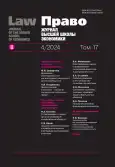Digital Ruble as a National Digital Currency: Issues and Prospects of Development in Context of World Experience
- Authors: Yakusheva E.1
-
Affiliations:
- National Research University Higher School of Economics
- Issue: Vol 17, No 4 (2024)
- Pages: 254-277
- Section: Law in the Modern World
- URL: https://journal-vniispk.ru/2072-8166/article/view/317733
- DOI: https://doi.org/10.17323/2072-8166.2024.4.254.277
- ID: 317733
Cite item
Full Text
Abstract
About the authors
E. Yakusheva
National Research University Higher School of Economics
Email: eeyakusheva@hse.ru
ORCID iD: 0000-0003-2901-0037
References
- Caudevilla O., Kim H. (2022) The digital yuan and Ccross-border payments: China’s rollout of its Central Bank digital currency. SSRN Electronic Journal, 36 p.
- Chapaev N.M. (2022) Digital ruble as the basis of the digital economy of Russia. Zhurnal prikladnykh issledovaniy=Journal of Applied Research, no. 6, pp. 544–547 (in Russ.)
- Goncharenko D. (2022) Money in the best form. Kommersant Bank, no. 174, pp. 1–8 (in Russ.)
- Jingwen W. (2022) Digital yuan, the official digital currency of China: legal nature and development trends. Rossiyskiy juridicheskiy zhurnal=Russian Law Journal, no. 1, pp. 71–75 (in Russ.)
- Khomyakova S.S. (2019) Transformation and consolidation of the term “digitalisation” at the legislative level. Molodoi uchenyi=Young Scientist, no. 41, pp. 9–12 (in Russ.)
- Kolobova M. (2022) Moved to crypto: business began to conduct cross-border transactions with digital currency. Izvestia=News, no. 187, pp. 4–7 (in Russ.)
- Liebman E. (2020) Asymmetric monetary and exchange rate policy in Latin American countries using inflation targets. Buenos Aires: Editorial de la Universidad, 130 p.
- Minakov A.V., Ivanova L.N. (2021) Ways of acquiring development in Russia. Zhurnal prikladnykh issledovaniy=Journal of Applied Research, no. 3, pp. 6–14 (in Russ.)
- Minbaleev A.V. (2018) Legal nature of blockchain. Vestnik Juzhnouralskogo gosudarstvennogo Universiteta=Bulletin of South Ural State University, no. 2, pp. 94–97 (in Russ.)
- Rozhdestvenskaya T.E., Guznov A.G. (2024) Legal regulating digital ruble. Aktualnye problemy rossiyskogo prava=Actual Issues of Russian Law, no. 1, pp. 48– 55 (in Russ.)
- Shumilova V. V. (2022) Digital ruble of the Bank of Russia as a new form of national currency. Pravovaya paradigma=Legal Concept, no. 2, pp. 156–162 (in Russ.)
- Tsikhilov A. (2019) Blockchain. Principles and fundamentals. Moscow: Alpina Digital, 300 p. (in Russ.)
- Turbanov A.V. (2024) Legal nature of the digital ruble account. Bankovskoye pravo=Banking Law, no. 2, pp. 40–51 (in Russ.)
- Vaganova O.V. (2021) Digital ruble: implementation prospects and ways of integration into financial system of Russia. Ekonomika. Informatika=Economics. Informatics, no. 48, pp. 507–513 (in Russ.)
- Yakovlev A.I. (2022) Digital ruble: issues of methodology. Theoreticheskaya ekonomika=Theoretical Economics, no. 5, pp. 100–106 (in Russ.)
- Zaloilo M.V. (2019) The anticipatory nature of lawmaking and the problem of synchronization of legal regulation. Zhurnal rossiyskogo prava=Journal of Russian Law, no. 9, pp. 20–28 (in Russ.)
Supplementary files








